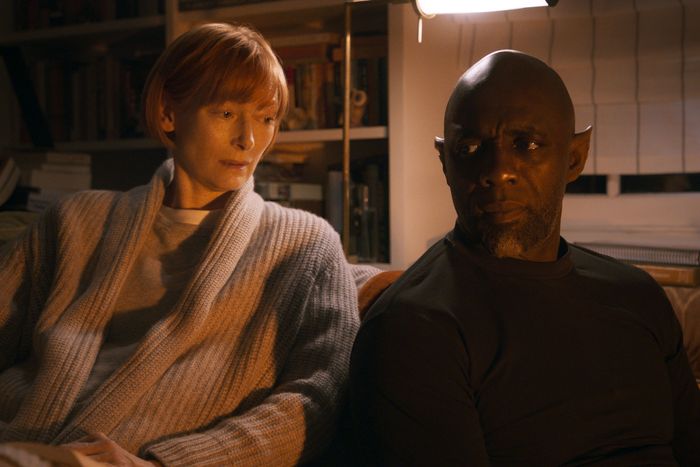
George Miller, one of the last true weirdos, has returned to Cannes and moviemaking after a seven-year hiatus with Three Thousand Years of Longing, a messy, maximalist fairy tale within a fairy tale within a fairy tale (about telling fairy tales) that feels like his answer to The Princess Bride. The film, which premiered last night at the festival to a six-minute standing ovation and mixed-to-positive reviews, has got Miller’s signature goofiness, earnestness, streaks of darkness, and whimsicality all over it. It’s imperfect — there are some oddly low-grade CGI moments, a few cringey visual jokes, and a final section that addresses Brexit and colonialist racism in a way that feels a little on-the-nose and forced — but ultimately impossible to resist in its bighearted, hopeful, off-the-wall wackiness. Miller, who’s been patiently working to adapt this A.S. Byatt short story since the ’90s, is telling a story about the importance of telling stories. It’s pure of intention and childlike in its sense of wonder, but it doesn’t skimp on the freakiness — there are supernatural sex scenes, a man whose head explodes into spiders, a sex prison lined with fur, Idris Elba sporting elf ears and occasionally expanding to the size of an entire hotel room, and elderly ladies calling Tilda Swinton a “fuckface.”
Tilda Swinton stars as “narratologist” Dr. Alithea Binnie — perhaps the second-most Tilda Swinton–esque name ever given to Tilda Swinton after “Tilda Swinton” — who travels the world giving lectures on the purpose of storytelling through the ages. After one such lecture in Istanbul, she purchases a blue bottle from an antique shop, heads back to her hotel room (which happens to be the one where Agatha Christie wrote Murder on the Orient Express), gives the bottle a good scrub with her electric toothbrush, and out pops a gigantic Idris Elba, coated in flecks of gold and scales. He’s a djinn who’s been trapped for the titular length of time, and he’s desperate to be freed.
All the djinn wants is to grant Dr. Binnie three wishes so he can get the hell out of our cacophonous modern cities, and all she wants is to avoid doing so, having spent her lonely but academically fulfilling life studying wish-fulfillment stories that all end badly. In the interest of persuading her otherwise, the djinn tells her richly detailed stories about his life, his various imprisonments, and the women he has loved and seduced with his otherworldly wisdom (he learns modern English from a TV screen in a few seconds flat) and sexual prowess (something to do with smoke and glitter). As the film darts from the small hotel room — where Elba and Swinton spend most of the film chatting in bathrobes — to the far more sweeping, CGI-filled worlds of the Ottoman Empire and the Queen of Sheba’s bedchambers, it manages to hold onto its Miller-esque tone, that specific combo of bizarro sweetness.
At the press conference the next morning, Swinton, Elba, and Miller were asked not once but twice what their own three wishes might be (visibly exhausted by the question, they mostly demurred and referred to their hopes for the film, but Elba admitted to wanting an “electric Ferrari”). They cheerfully recounted how they’d all ended up working together. Swinton — a self-described Miller “superfan” who said she tells her kids, “That’ll do, pig,” when they accomplish a task — and Miller met by chance at a Cannes lunch five years ago: “I was invited to a celebration lunch, and I was very shy and I didn’t know very many people there, and I sat down opposite someone I didn’t recognize. And we just fell into a very beautiful conversation. About 15 minutes in, I realized it was George Miller,” she said, to laughter. “And that was it. The die was cast. We hung out the whole day. We sat together with Bong Joon Ho in the evening. That was a very good table. We became friends quite quickly and deeply.” About a year later, Miller emailed her the script. “I don’t pick roles. I pick people,” added Swinton. “And I always have, and it’s really served me well. If it ain’t broke, don’t fix it. I’m not changing it now.”
“You pick your directors, they don’t pick you,” said a charmed Miller. “I realized very early on that I joined the great club of directors with whom Tilda has worked not only once but several times. I’ve had the first taste … I hope that the future sees us doing something else.” Swinton, who earlier joked that she’d wished she’d been asked to do Mad Max: Furiosa, jumped in: “I’ve got witnesses!”
Elba and Miller made each other’s acquaintance a few years ago at the BAFTAs, where Miller’s wife and longtime film editor, Margaret Sixel, said the only person she was interested in meeting at the awards show was Elba. “I didn’t think he knew who I was,” laughed Elba. “A year later, my agent calls me and says, ‘George Miller would like to talk to you.’ After I fainted and got up off the floor, I began talking to George.” Elba was the only actor Miller ever considered for the role, which required an actor with the ability to project both groundedness and the fantastical. “Luckily, if I hadn’t met you and gotten a strong sense of you, I would have no idea who could play the djinn. I honestly to this day couldn’t name anyone. I’m sure there are a lot of people,” Miller said. “There’s no other actors that could do it,” joked Elba.
More From the 2022 Cannes Film Festival
- How to Find Hope and Destroy It
- Charlbi Dean, Star of Palme d’Or Winner Triangle of Sadness, Dead at 32
- Freak Out! Over New Bowie Footage in Moonage Daydream


